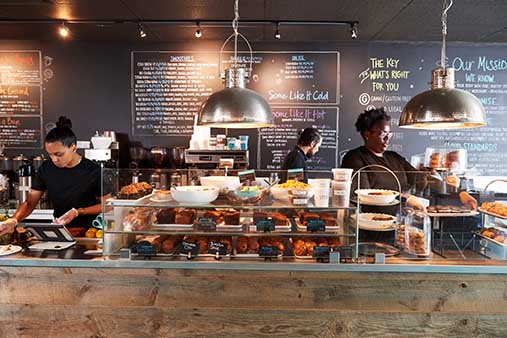Advice to go from Barista to Coffee Shop Business Owner
Working as a barista will help you gain the experience and connections you'll need to open your own coffee shop. Researched and written with baristas in mind, this step-by-step guide outlines what you need to know to go from barista to coffee business owner.
Recommended: Read our full, in-depth How to Start a Coffee Shop Business guides, inspired by coffee professionals, they will help make your coffee dreams real, from sourcing beans to hiring baristas, choosing the best POS system, forming an actual company, and everything in between.

6 Steps to Go from Barista to Business Owner
Step 1: Choose the Type of Coffee Business You Want to Own
With so many different types of coffee businesses — from coffee shops to roasteries, mobile coffee carts or coffee importing companies — this industry provides a wide range of options. Whatever your passion within the coffee world, you can determine the right coffee business for you by answering these questions.
- In Which Part of the Coffee Industry Do You Want to Work? If you’re primarily interested in one aspect of the coffee industry — such as roasting, coffee shop management, or importing — that can inform the best choice for your coffee business model.
- What’s Your Budget? You may have saved some money or found a few investors for your coffee venture. Whatever your funding, pull the numbers together and assess how much you can spend on start-up costs.
- How Much Time Can You Dedicate to Your Business? Consider your existing time commitments and what that leaves you with to dedicate to your business. If you’re short on time, for example, you might benefit from a coffee business you can start from home.
- What’s Your Skill Level? Your existing skill set represents another important consideration. If your desired business requires skills outside your current knowledge, consider what additional coffee education you’ll need in order to make your goals a reality.
Step 2: Learn as Much as You Can at Work
Leverage the resources at your current job — your manager, the cafe owner, your coworkers, and the vendors — to learn everything you can from your surroundings. Specifically, you should:
- Put in the Work at Your Current Job to Grow Within the Company. The best way to learn is through experience. If possible, dedicate yourself to delivering the best possible job performance in your current role so you can move up and gain firsthand knowledge of what works and what doesn’t within your coffee work environment. You can then apply those insights to improving your future business.
- Learn How Much Supplies Cost and How to Order Them. If you can, take over inventory management at your current coffee job. Knowing the cost of all the supplies needed to operate a coffee business — and how much to order of each at what time to stay well-stocked and on budget — will prove valuable when starting your own business.
- Talk to Your Bosses. Ask your superiors for their advice about how to succeed in the coffee industry. Most likely, these professionals will have experiences from which you can learn before going out on your own.
- Talk to Your Coworkers and Pay Attention to Your Work Environment. Ask your coworkers what they look for in a coffee job and what keeps them happy as an employee. Be sure to also examine your current workplace to determine if it’s a positive work environment or one that needs improvement. You can then use this information to develop a positive workplace of your own and minimize your turnover rate.
Step 3: Expand Your Coffee Knowledge
Before starting your own business, you may want to expand your coffee knowledge. You’ll find a wide range of resources for coffee education and, depending on your location, potentially even a course or workshop in your local area. Here are a few sources of the best coffee workshops and courses:
- Specialty Coffee Association (SCA) Coffee Courses: The SCA is a great resource for anyone in the coffee industry looking to increase their knowledge or connect with the coffee community worldwide. Education through the SCA can happen either as part of a certificate program or as individual courses.
- U.S.-Based Coffee Schools: Across the United States, many independent coffee schools offer education for baristas, roasters, and coffee shop managers or owners. For example:
- Texas Coffee School offers a wide range of courses and workshops to help coffee professionals build their skills on the bar as well as develop their coffee management and business knowledge.
- The American Barista & Coffee Workshops (from Bellissimo Coffee Advisors) cover everything from barista skills to coffee business management and roasting.
- Seattle Barista Academy makes a great option for anyone seeking a strong understanding of coffee extraction and preparation as well as the skills needed to successfully run a coffee shop.
- International Barista Coffee Academy offers two key courses: one focused on building coffee preparation skills and a second aimed at helping students learn important information about coffee labeling, green coffee buying, roasting, and cupping.
- Your Surrounding Coffee Community: You can learn a lot from coffee professionals in your area by participating in a workshop or cupping they host or simply asking them for a chat. Tapping into local coffee resources is a great way to learn helpful tips to inform your new business venture.
Step 4: Sharpen Your Business Skills
You know how to make a great cup of coffee, but now it’s time to learn a few other skills in order to make your dream coffee business a reality. Taking a business course from a local college or online university — or completing a business management workshop in your area — can help you build the skills you need to succeed. For example, you’ll need to know how to:
- Create a Business Plan: Before you can approach investors or apply for a business loan, you’ll need to develop a detailed business plan that communicates your goals and path forward.
- Choose Your Business Structure: You can establish your formal business structure in one of two ways: either by creating a corporation or a limited liability company (LLC). For coffee businesses, forming an LLC provides the most straightforward business structure that also emphasizes protection of your personal assets.
- Operate a Business: Consider taking a basic business or management course if you don’t have much experience operating a business. Check out your local community college for relevant courses or research online business workshops that will fit into your schedule.
Step 5: Start Thinking About Financing
How will you fund your entrepreneurial venture? Unless you have enough money saved to cover all of your start-up costs, you’ll need to consider other financing options. Here are four actions you should take before starting your coffee business:
- Start saving whatever you can — now.
- Look into loans from the U.S. Small Business Administration.
- Talk to potential investors.
- Consider crowdfunding options.
If necessary, reassess your ambitions. If financing your new business seems a little unattainable, consider starting smaller. Instead of opening a brick-and-mortar coffee shop right away, for example, you could start with a mobile coffee cart. Or, you could use a communal roasting space for a while instead of opening your own roastery. You can scale your business back in a variety of ways in order to accommodate your available funding and generate the income needed to expand your business in the future.
Step 6: Learn From the Experts
In the “How to Start a Coffee Shop Business” video series, coffee business owners and experts share insider tips on everything from planning to growing your business. If you’re ready to make the move from barista to business owner, these videos can help you learn how to succeed in your entrepreneurial venture.

